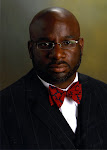
No, not in front of the TV watching bodies fly and helmets crunch. You'd better believe I've got my behind in a church pew, trying to work out my own salvation.
Like so many other African Americans, I grew up in church. My grandmother's name is still etched into the cornerstone of St. Paul A.M.E. Church in Berkeley, Calif., as it's been since 1953.
Unlike other public places, we didn't have to check our culture at the church's door for acceptance. Church was a place where we clapped, joyfully shouted "hallelujah," and reveled in the hope we had as African Americans. It was the same cultural fulfillment I imagine that Jews find in a synagogue, Catholics find in a cathedral, Muslims find in a mosque, and Buddhists find in a temple.
At the same time, the Scripture tapped into our sense of being. I learned that God was on the side of the "least of these" - on my side. That yes, Jesus loves me, even when nobody else does.
Most of all, it was there where I learned how to forgive and to love others.
So I was not one of those suckered into blind judgment of the Rev. Jeremiah A. Wright Jr., one of the nation's foremost theologians and Sen. Barack Obama's former pastor, when I saw the endless clips of seemingly incendiary sound bites from a few of the sermons he gave during his 20 years at Trinity United Church of Christ in Chicago.
With every spool of the now-infamous video splices (source unknown), the pundits became more accusatory with their own vitriol, throwing around words like hate speech, characterizing the pastor as a nut and fanatic, and insisting that Obama should have walked away.
Even now, they continually talk about "the Jeremiah Wright problem" as if it's some incurable disease about to overtake the nation.
It didn't take a prophet to realize that what we were hearing certainly wasn't the measure of this man.
Nor a true reflection of the black church, especially from people who'd never been in one.
Suddenly, if you believed those pundits screeching from their bully pulpits, every black church was preaching hate, was full of conspirators, was unpatriotic. The black church was the devil in disguise.
No viewer would have a clue that my church, like most black churches, was not just a house of worship but also served as a credit union, cultural center, therapist's couch, day-care center, food pantry and so much more.
On Sunday, I chose to worship at Macedonia A.M.E. Church in Camden.
As part of the service, Macedonia's pastor, the Rev. Mark Kelly Tyler, had promised to play one of Wright's sermons in its entirety so that we, the congregation, could decide. Tyler has always been an admirer of Wright, known worldwide as one of the best orators and respected theologians, and whose father was pastor of Grace Baptist Church of Germantown for 32 years.
"As a student of preaching, I try to find people who not only have something significant to say nationwide, but in the world," said Tyler. "I know he's not a preacher of hate.
"Theology has called us to be prophetic and not popular. Even the biblical prophet Jeremiah was called unpatriotic."
When Obama delivered his historic speech on race a few weeks ago, the symbolism for Tyler was not that it was made at the Constitution Center or across the street from Independence Hall. It was that he was speaking a few blocks from St. George's Methodist Church, where black parishioners in 1787 were pulled off their knees and told to go pray in the balcony by white church officials. It's what called Richard Allen and Absalom Jones to create the African Methodist Episcopal Church in 1816.
"To me, as a person of the A.M.E. Church, it was that Barack was speaking at Ground Zero of race relations in the church," said Tyler.
Which is why the motto of Wright's Trinity Church - "unapologetically Christian, unashamedly black" - is more about pride than race.
Mayor Nutter and so many others say they would have walked away. I understand why Obama didn't.
What we heard listening to Wright's full sermon, the one that followed the 911 attacks, was very different from the distorted video of the pastor's ranting about "the chickens are coming home to roost."
Sure, he blasted the country for misusing its super power at times and for being arrogant enough to think that we would never be attacked. But the real question he asked in his sermon was how "we" as a country would respond.
This was a time, he said, to examine ourselves and our own relationship with God. A time for social transformation for our country, and a time to give thanks for all that we have as citizens of this country and as people of God.
He always used "we" as Americans, never "them" or "us."
And he ended his sermon in a way that we never would have known from the distorted video.
He reminded us to love one another, to take time to give thanks, to thank God for the lives of the lost in the attack and for the ways in which those who died touched us.
And then he asked members of the congregation: When was the last time they told their family they loved them?
"Turn to your neighbor and say, 'I love you.' ''
And hearing his urging on audio in the church, that's what we did.
Contact columnist Annette John-Hall at 215-854-4986 or ajohnhall@phillynews.com. To read her recent work: http://go.philly.com/annette.
| |
| Find this article at: http://www.philly.com/inquirer/columnists/20080401_Annette_John-Hall__Hearing_Wright_s_real_sermon_-_not_incendiary_sound_bites.html?adString=inq.columnists/columnists;!category=columnists;&randomOrd=040108090317 |

No comments:
Post a Comment